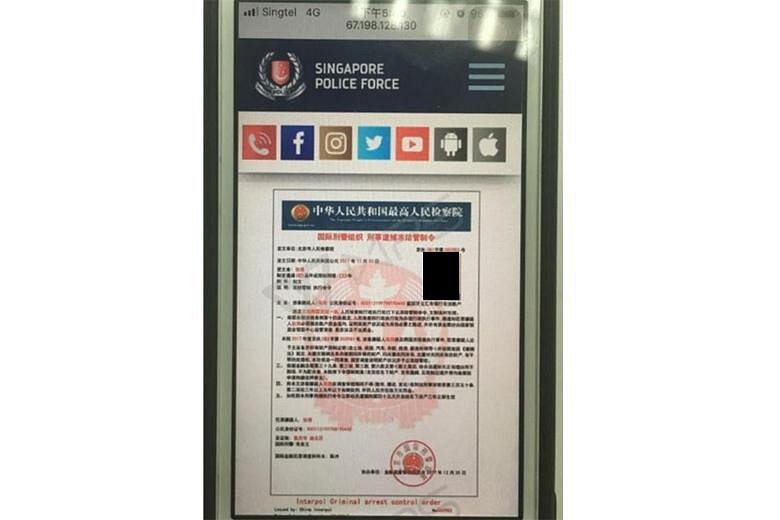SINGAPORE - At least 158 victims have been duped by bogus Chinese government officials between January and November in 2017.
In a statement on Thursday (Dec 28), the police said the victims have lost more than $12 million so far to scammers who pretend to be officials from the Chinese Ministry of Public Security or Chinese Interpol.
Citing a recent case, the police said a 19-year-old Chinese national had believed that he was being investigated by the Chinese Interpol.
To prove his innocence, scammers instructed the student to cut off all communication with his family members and friends.
He was deceived into acting as a secret operative for the "Chinese authorities" to collect monies from other victims, as well as faking his own kidnapping in Singapore to help the "Chinese authorities" cripple an international syndicate.
He was, in fact, helping the impersonators in other scam cases targeting Singapore residents.
In another recent case, a 17-year-old female student was duped into believing that her credit card had been used for money laundering.
The woman, a Chinese national, had received a call from someone claiming to be an official from the International Financial department unit.
She was instructed to send nude photos to verify the features on her body, as proof that she was not connected to the case and that she did not have a sexual relationship with another male money launderer.
She was later asked to transfer money to a bank account in China.
And when she failed to do so, the scammers threatened to release her photos on Facebook.
She later realised it could be a scam and made a police report.
The police, in the statement, also revealed details on the modus operadi of such scams:
Step 1: Victims would receive unsolicited messages or calls from strangers. These calls usually employ caller-ID spoofing technology and may look like they are from official government hotline numbers such as 110 or 999.
Step 2: Victims were then told that they had committed criminal offences and were required to assist in criminal investigations by doing either of the following:
* Victims were instructed to provide their Internet banking details, one-time password for investigation purposes, or directed to a fake website of the Singapore Police Force or the China Police to key in their banking details. Victims might also be shown fake warrant of arrests bearing their photographs on these fake websites.
* Victims were asked to withdraw their money and pass it to strangers or remit the money to bank accounts in China.
* Victims were instructed to send nude photos of themselves to prove that they did not have unique features on the body that resemble the criminals the scammers claimed they were looking for.
Step 3: Victims were then threatened with arrests by the "Chinese authorities" or exposure of the photos if they did not do as told.
The police said they take "a serious view against any person who may be involved in scams, whether knowingly or unwittingly".
Anyone convicted of knowingly assisting in dealing with the monies derived from criminal conduct may face a fine of up to $500,000 or a jail term of up to 10 years.
Those who have any information related to such crimes are advised to call the police hotline on 1800-255-0000, or dial 999 for urgent police assistance.
To seek scam-related advice, the public may call the anti-scam helpline on 1800-722-6688 or go to www.scamalert.sg


